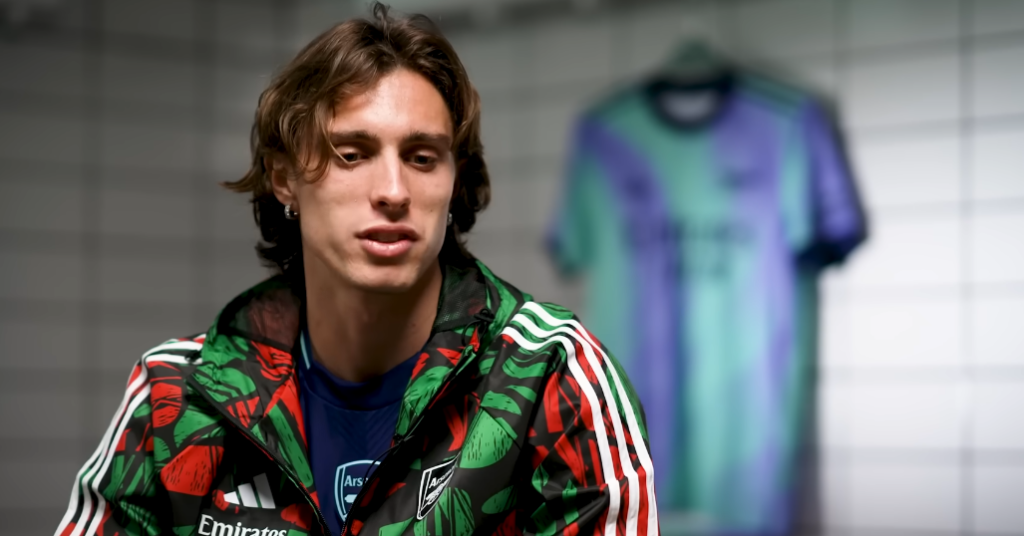In addition to his skill as a football player, Riccardo Calafiori’s ascent to fame has been especially noteworthy for the way he has handled personal setbacks in the face of intense public scrutiny. Just as his £33.7 million move to Arsenal was coming to an end in July 2024, another story broke online. His girlfriend Benedetta Beome was credited with a widely shared TikTok post that claimed their relationship was over, implied infidelity, and even mentioned his new club. However, she swiftly came forward to call the entire post fraudulent.
The lengthy, emotional paragraphs that thanked fans for their support, alluded to a dubious video, and provided closure that felt authentically raw were all characteristics of a heartfelt post. It felt real, and it touched a nerve. However, Benedetta took swift and decisive action. “I don’t have a TikTok account,” she posted on Instagram. “I’m being impersonated.” Please remove it before I file a lawsuit. Her tone, which was calm but firm and incredibly clear, probably helped keep the story from turning into a full-fledged tabloid storm.
Riccardo Calafiori – Bio & Career Overview
| Category | Details |
|---|---|
| Full Name | Riccardo Calafiori |
| Date of Birth | May 19, 2002 |
| Nationality | Italian |
| Playing Position | Defender (Left-back/Centre-back) |
| Current Club | Arsenal FC (Signed from Bologna in 2024) |
| Previous Clubs | AS Roma, Genoa (loan), FC Basel, Bologna FC |
| Notable Tournament | UEFA Euro 2024 – Played 3 matches for Italy, 1 assist vs Croatia |
| Relationship Status | Allegedly split from Benedetta Curatella (unconfirmed) |
| Off-Field Controversy | Viral breakup post from fake TikTok account |
| Source | Daily Mail |
Although Benedetta’s response was prompt, there was a noticeable split in the online community. All public evidence of their relationship vanished soon after, despite her denial. Their pictures disappeared. One of them unfollowed the other. And that says a lot in the language of digital relationships today. Without releasing a press release or creating a breakup podcast, it’s a remarkably effective way to indicate that something has changed.

Calafiori are not the only ones who do this. Relationships have been scrutinized, theorized, and occasionally even fictionalized in sports, making them public property. Players like Jude Bellingham, whose rumored romances frequently overshadow his match stats, and Jack Grealish, whose relationships appear to trend more frequently than his assists, have shown similar trends. Accordingly, Calafiori’s story is part of a larger trend in which young athletes have their personal lives scrutinized in real time, frequently by unreliable strangers.
Naturally, the timing couldn’t have been more urgent. Calafiori had just finished an incredibly successful season with Bologna, where his mature and defensively stable performances received widespread acclaim. After earning his first senior Italy call-up, he made three strong starts at Euro 2024. That level of reliability under duress is extremely valuable, especially for a defender joining one of the most closely watched leagues in Europe.
But it wasn’t just his poise on the field that was noteworthy. He was completely silent off the field. No cryptic messages, no PR-managed clarification, no sub-tweets. Simply professionalism. That kind of restraint is refreshing in a time when sharing too much has become commonplace. It implies emotional control and an emphasis on long-term objectives, qualities that are especially helpful when adjusting to a demanding setting like the Premier League.
An important question concerning identity, ownership, and emotional manipulation in digital spaces was also brought up by the fake post incident. The anonymous poster took over Benedetta’s voice and credibility by impersonating her, resulting in a narrative that spread far more quickly than any correction could. This situation is remarkably similar to what many public figures and influencers have encountered recently: when misleading information is presented in such a convincing way that it temporarily overrides the truth and causes harm.
The consequences were immediate for Benedetta, a model and influencer with a developing platform of her own. Fans were unconvinced despite her public denial. The timing had been too perfect, the story too detailed. Even after she took the uncommon step of threatening legal action, that skepticism persisted. It serves as a reminder that even facts cannot reverse an idea once it has gained emotional traction.
A new type of celebrity breakup has emerged in the last ten years, one that is curated by algorithm-fed drama rather than publicists. Digital sentiment is now used to monetize relationships, and if a lie fits the expectations of the audience, it may even become popular. Calafiori’s story was more than just football rumors to younger fans in particular; it was a poignant tale of betrayal, atonement, and closure.
There is, however, a compelling bright side to this situation. Calafiori demonstrated a very effective response technique by remaining silent and concentrated. His performances spoke for themselves. That instinct is extremely uncommon and impressive, especially for someone who is only 22 years old. It’s the kind of poise that wins teammates and coaching staff quiet respect in addition to fostering trust with supporters.
The qualities Calafiori has already demonstrated under scrutiny—reliability and resilience—will be expected by Arsenal supporters in the upcoming seasons. It is encouraging that he can separate his personal issues from his professional responsibilities, particularly as he enters one of the most demanding environments in football. And if the story of the fake breakup has taught us anything, it is that a player’s behavior off the field can be just as significant as their actions on the field.


